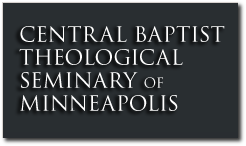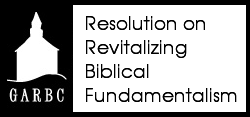Ethos Statement on Fundamentalism & Evangelicalism
 Republished with permission (and unedited) from Central Baptist Theological Seminary. (The document posted at Central’s website within the last couple of weeks.)
Republished with permission (and unedited) from Central Baptist Theological Seminary. (The document posted at Central’s website within the last couple of weeks.)
Fundamentalism and Evangelicalism
As iron sharpens iron,
one person sharpens another. (Proverbs 27:17)
 Republished with permission (and unedited) from Central Baptist Theological Seminary. (The document posted at Central’s website within the last couple of weeks.)
Republished with permission (and unedited) from Central Baptist Theological Seminary. (The document posted at Central’s website within the last couple of weeks.)
Fundamentalism and Evangelicalism
 Read Part 1, Part 2, Part 3, Part 4, Part 5, Part 6, Part 7, Part 8, Part 9, Part 10, and Part 11.
Read Part 1, Part 2, Part 3, Part 4, Part 5, Part 6, Part 7, Part 8, Part 9, Part 10, and Part 11.
The differences between fundamentalists and conservative evangelicals include considerable disparity in their attitudes toward miraculous gifts. Fundamentalists are almost universally and vigorously cessationists. Conversely, many conservative evangelicals are continuationists, and those who are not can still function comfortably with the ones who are. From a fundamentalist perspective, this difference is rather a significant one.
Nevertheless, fundamentalists and conservative evangelicals do hold much in common. What they hold in common is properly designated as koinonia or fellowship. It would be hypocritical to pretend that this fellowship does not exist, just as it would be hypocritical to pretend to enjoy fellowship where none existed.
Most fundamentally (the word is deliberate), both groups are united in their affirmation and exaltation of the gospel. None of the differences that we have examined to this point results in a denial of the gospel. Both fundamentalists and conservative evangelicals believe the gospel, preach the gospel, and defend the gospel.
This mutuality in the gospel leads to a question. Since conservative evangelicals and fundamentalists are united in their allegiance to the gospel, should they not be able to cooperate at the level of the gospel? To put it positively, should fundamentalists and conservative evangelicals get together for the gospel?
 Read Part 1, Part 2, Part 3, Part 4, Part 5, Part 6, Part 7, Part 8, Part 9, and Part 10.
Read Part 1, Part 2, Part 3, Part 4, Part 5, Part 6, Part 7, Part 8, Part 9, and Part 10.
Among other things, fundamentalists and conservative evangelicals differ over the question of miraculous gifts. Nearly all fundamentalist leaders insist that miraculous gifts ended with the apostolic age. Several prominent conservative evangelicals have argued for the continuation of those gifts. Just as importantly, fundamentalists do not pursue public ministry or cooperation with continuationists. Many conservative evangelical leaders, however, are willing to downplay their differences over miraculous gifts in order to perpetuate certain forms of public cooperation.
Doctrines and practices differ in their importance. Therefore, errors differ in their gravity. In the debate between cessationists and continuationists, one party must be in error. The question is, How serious is the error?
To put it a different way, fellowship centers upon something that is shared or held in common. Continuationists and cessationists clearly do not hold certain things in common, which means that they do not have fellowship in those areas. Given that their fellowship has been limited objectively by those differences, how far-reaching are the implications for public cooperation?
 Read Part 1, Part 2, Part 3, Part 4, Part 5, Part 6, Part 7, Part 8, and Part 9.
Read Part 1, Part 2, Part 3, Part 4, Part 5, Part 6, Part 7, Part 8, and Part 9.
Are fundamentalists and conservative evangelicals really the same thing under different labels? In order to answer that question, we must investigate the apparent differences. So far in this series we have looked at two.
First, we asked the extent to which each favored dispensationalism. We discovered that fundamentalists tend to be dispensationalists while evangelicals tend to be non-dispensationalists. In evaluating the significance of this difference, however, we found that it really did not mark out a major division between fundamentalists and conservative evangelicals.
Second, we explored the accusations that (according to some evangelicals) fundamentalists tend toward legalism and (according to some fundamentalists) evangelicals tend toward worldliness. In trying to understand these mutual recriminations, we found that they tended to focus upon revivalistic taboos, concessions to the counterculture, the acceptance of extra-Scriptural second premises in moral argument, and the degree to which churches adapt their congregational life to popular culture. These differences are sometimes matters of degree, but they are nevertheless real. I am willing to argue that more often than not, fundamentalists have been more right than evangelicals on these matters, including most conservative evangelicals.
 Read Part 1, Part 2, Part 3, Part 4, Part 5, Part 6, Part 7, and Part 8.
Read Part 1, Part 2, Part 3, Part 4, Part 5, Part 6, Part 7, and Part 8.
How different are fundamentalists from conservative evangelicals? We have now examined two answers to that question. The first answer had to do with dispensationalism. We concluded that, although fundamentalism has a higher percentage of dispensationalists, this difference creates no greater tension between the two groups than it does within each group.
The second difference that we examined was the putative legalism of fundamentalists (according to evangelicals) and the supposed worldliness of evangelicals (according to fundamentalists). We have tried to discover what these accusations mean. Our working hypothesis includes the following factors. First, fundamentalists tend to observe certain revivalist taboos more frequently than evangelicals. Second, fundamentalists are more reluctant to adopt the accouterments of the counterculture that emerged during the 1960s. Third, fundamentalists are more likely to accept second-premise arguments when the extra-scriptural premise relies upon a judgment. Fourth, evangelicals tend to employ more recent versions of popular culture in their church life, while fundamentalists tend to hang on to older and now obsolete manifestations of popular culture.
 Read Part 1, Part 2, Part 3, Part 4, Part 5, Part 6, and Part 7.
Read Part 1, Part 2, Part 3, Part 4, Part 5, Part 6, and Part 7.
Fundamentalists and evangelicals (including conservative evangelicals) both want to distinguish themselves from one another. Fundamentalists usually want to be known as fundamentalists, or at least to find some label that says more than “evangelical.” For their part, evangelicals of all sorts are eager to avoid being mistaken for fundamentalists.
When asked about their differences, both groups often respond with stock answers. According to many evangelicals, fundamentalism has been polluted with legalism or externalism, while fundamentalists often say that evangelicalism has been tainted with worldliness. Each group has typically taken its perception of the other to be virtually axiomatic.
What I have been trying to do is to discover what each party means by its accusation. What do fundamentalists see in evangelicals that smacks of worldliness? What do evangelicals see in fundamentalists that seems legalistic?
I have suggested several answers to those questions. First, fundamentalists and other evangelicals have often differed over their observance of what I have called “revivalistic taboos.” Second, fundamentalists have been more hesitant to adopt the accouterments of the counterculture (now mainstream culture) that began in the 1960s. Third, evangelicals have been more suspicious of second-premise arguments when the second premise has relied upon a matter of judgment rather than a statement of fact.
 Read Part 1, Part 2, Part 3, Part 4, Part 5, and Part 6.
Read Part 1, Part 2, Part 3, Part 4, Part 5, and Part 6.
Making generalizations about either fundamentalists or other evangelicals is a bit presumptuous. Both groups are quite diverse, and exceptions can be found to most generalizations. Non-fundamentalistic evangelicalism covers an especially broad array of influences and movements.
The diversity of each group has rarely been realized by the other, however, and so each group does tend to posit generalizations about the other. One of those generalizations has to do with the matter of worldliness and legalism. Fundamentalists tend to think of other evangelicals as worldly. Those evangelicals tend to think of fundamentalists as legalistic.
We are not yet to the point of weighing the merits of these perceptions. For the moment, what we are trying to do is to understand what each group means when it speaks about the other. What do fundamentalists see that leads them to think evangelicals are worldly? What do evangelicals see that leads them to perceive fundamentalists as legalistic?
Articulating these perceptions more fully will be useful in two ways. First, it will furnish us with criteria for assessing the merits of the judgments that evangelicals and fundamentalists make about each other. Second, it will provide us with a device for distinguishing some evangelicals from other evangelicals as well as some fundamentalists from other fundamentalists.
 Read Part 1, Part 2, Part 3, Part 4, and Part 5.
Read Part 1, Part 2, Part 3, Part 4, and Part 5.
When evangelicals think about fundamentalists (which is not often), they typically consider them to be rather legalistic. When fundamentalists think about other evangelicals (which is nearly constantly), they usually consider them to be quite worldly. The purpose of the present investigation is not to endorse either indictment but to identify what each party has in mind when it levels its accusation against the other.
What do fundamentalists perceive about evangelicals that seems worldly to them? What do evangelicals see in fundamentalists that seems legalistic? The answer to these questions primarily revolves around two areas: (1) standards of conduct, and (2) methods of ministry. Each of these areas is significant enough to warrant at least one essay of its own.
By “standards of conduct,” I do not mean to suggest that one party possesses standards while the other does not. Both parties agree that the Bible says something about how people should live. Both parties recognize that biblical commands and principles, rightly applied, require or prohibit particular activities. Both parties will, at some point, use some external standards of conduct as mechanisms by which to gauge spiritual wellbeing.
Making such evaluations is not necessarily legalism. Legalists believe that their external conduct actually secures some measure of standing with God. That is a different matter than recognizing that external conduct often reflects one’s relationship with God.
 Ninety years ago we gave ourselves a name: Fundamentalists.
Ninety years ago we gave ourselves a name: Fundamentalists.
“We suggest that those who still cling to the great fundamentals and who mean to do battle royal for the great fundamentals shall be called ‘Fundamentalists,’” wrote Curtis Lee Laws in the July 1, 1920 issue of the Watchman-Examiner, a Baptist newspaper with loose ties to the Northern Baptist Convention.
And 90 years later, we still discuss the implications of the Fundamentalist label. Back then, the issues seemed crystal clear: either you believed the Bible was true, or you didn’t. Simple to articulate and easy to defend, the idea of Fundamentalism was expressed as core doctrinal beliefs. Lines were drawn. Positions were staked. Ink was spilt, often.
But language is elastic, meaning is elusive, and sometimes words just wear out.
Discussion